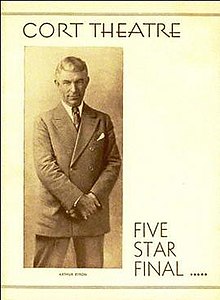Five Star Final (play)
| Five Star Final | |
|---|---|
 Broadway program cover | |
| Written by | Louis Weitzenkorn |
| Date premiered | December 30, 1930 |
| Place premiered | Cort Theatre |
| Original language | English |
| Genre | Melodrama |
Five Star Final is a play written by Louis Weitzenkorn. The story is a melodrama about the evils of tabloid journalism. Producer A. H. Woods staged it on Broadway, where it was a hit, running for 175 performances.
Plot[edit]
An unscrupulous newspaper publisher decides to boost circulation by reviving an old scandal involving Nancy Voorhees, a woman who was accused of murdering her lover twenty years before. Although she was acquitted by a jury, Nancy fears the damage a revival of the story could cause her family. She is married and has a daughter who is about to have her own wedding to a wealthy young man whose family would not approve of Nancy's past. Nancy begs the assigned reporter not to pursue the story, but he refuses. When the story is published on their daughter's wedding day, Nancy and her husband commit suicide. The daughter seeks out the reporter to kill him for vengeance, but discovers that he is wracked with guilt over what he has done.
Broadway production[edit]
Producer A. H. Woods acquired the rights to the play in 1930. At first his intention was to co-produce the play with William A. Brady and have it appear at Brady's Playhouse Theatre.[1] However, this plan fell through and the production finally opened at the Cort Theatre on December 30, 1930, with just Woods producing. Worthington Miner directed. Arthur Byron played the reporter and Merle Maddern played Nancy.[2]
Weitzenkorn was busy revising the script up until the premier, and apparently after as well. Reviewers complained that the first performance was insufficiently rehearsed, and descriptions of the scenes on opening night differ from what was done later.[2][3]
Cast and characters[edit]
The characters and cast from the Broadway production are given below:

| Character | Broadway cast[4] |
|---|---|
| Mr. Arthur Loveland Weeks | Sydney Booth |
| Exchange Operator | Lillian Bronson |
| Randall | Arthur Byron |
| Philip Weeks | King Calder |
| Hinchecliffe | Berton Churchill |
| Brannegan | Frank Dae |
| Colby | Kenneth Dana |
| A Policeman | Mike D'Arcy |
| Pearl | Amy Dennis |
| Michael Townsend | Malcolm Duncan |
| Jenny Townsend | Frances Fuller |
| Minerva | Georgette Harvey |
| Undertaker | Fred House |
| Harold | Richard Huey |
| Luella Carmody | Laurie Jacques |
| Ziggie Feinstein | Allen Jenkins |
| Jerry | P. J. Kelly |
| Arthur | Alvin Kerr |
| Mrs. Arthur Loveland Weeks | Kathryn Keyes |
| Rooney | Bruce MacFarlane |
| Nancy Voorhees Townsend | Merle Maddern |
| Miss Edwards | Madeleine Marshall |
| Trixie | Dorothy McElhone |
| Rev. T. Vernon Isopod | Alexander Onslow |
| French | Henry Sherwood |
| Miss Taylor | Helene Sinnott |
Reception[edit]
The play received reviews that treated it as a justified indictment of sensationalist journalism, albeit with some reservations.[3][5] In The New York Times, reviewer Brooks Atkinson took exception to uneven writing and performances, but described it as an "exposé" that deserved consideration "whatever your opinion of the dramatic workmanship".[2] In an article several days later, Atkinson said the play was sometimes as sensationalistic as those it condemned, but it "strikes a crushing blow" against the press.[6] In the Outlook and Independent, Otis Chatfield-Taylor described the production as flawed in several ways, but nonetheless "something very much to be seen" for its "moments of undeniable drama and pathos" and its "violent polemic" against journalistic scandal-mongering. He praised the work of Woods, Miner and the cast.[7]
Adaptations[edit]
The play was adapted as a movie twice. The 1931 movie Five Star Final was directed by Mervyn LeRoy and starred Edward G. Robinson, and was nominated for the Academy Award for Best Picture at the 5th Academy Awards. In 1936 the play was again adapted for a movie, this time titled Two Against the World. William C. McGann directed and Humphrey Bogart starred.
References[edit]
- ^ "Brady Ready to Cast Newspaper Drama". The New York Times. August 27, 1930. p. 25.
- ^ a b c Atkinson, J. Brooks (December 31, 1930). "The Play: Indicting the Press". The New York Times. p. 11.
- ^ a b Bordman, Gerald (1996). American Theatre: A Chronicle of Comedy and Drama, 1930–1969. New York: Oxford University Press. p. 18. ISBN 0-19-535808-2. OCLC 252547085.
- ^ "Five Star Final". Internet Broadway Database. Retrieved September 1, 2016.
- ^ Hischak, Thomas S. (2009). Broadway Plays and Musicals: Descriptions and Essential Facts of More Than 14,000 Shows through 2007. Jefferson, North Carolina: McFarland. p. 145. ISBN 978-0-7864-5309-2. OCLC 456377061.
- ^ Atkinson, J. Brooks (January 11, 1931). "Being an Appeal to Reason". The New York Times. p. X1.
- ^ Chatfield-Taylor, Otis (January 21, 1931). "The Theatre". Outlook and Independent. Vol. 157, no. 8. p. 112.
